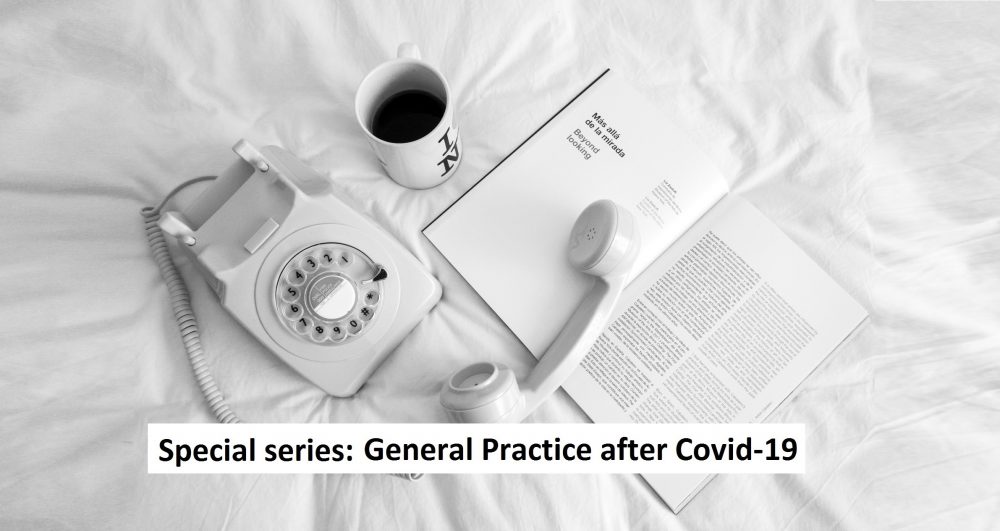 Joanne Reeve is a GP, professor of primary care, and leads the @wisegpcouk programme. She is on Twitter: @joannelreeve
Joanne Reeve is a GP, professor of primary care, and leads the @wisegpcouk programme. She is on Twitter: @joannelreeve
There has been much discussion of the impact of a move to telephone consultation on both the doctor-patient relationship, and the morale and motivation of clinicians. But to date, there has been less consideration of the potential impact on the scientific practice of medicine. General Practice is a scientific discipline – making use of both the knowledge (evidence) and method (reasoning) of scientific practice. So what are the implications of a move to teleconsultations?
In a recent blog, Hammond considered the impact of remote consultations on her clinical reasoning in practice.1 She spoke of the need for closer listening and attention to the patient’s story, supporting deeper reflections. She recognised this as a shift from the everyday short-hand thinking of ‘pattern recognition’ back to a deeper, hypothetico-deductive thinking.
But generalist medicine, expertise in whole person care, uses a different model of scientific reasoning again – that of inductive reasoning.2 The hypothetico-deductive reasoning of specialist medicine aims to describe the probability of a given disease state behind a presented health problem. Generalist medicine instead requires a practitioner to infer an explanation of illness based on critical consideration of a range of factors relevant to understanding an individual’s illness. These include patient symptom and signs, alongside contextual data, diagnostic and management guidelines, as well as professional mindlines.3 Inductive reasoning thus uses multiple data sources, many derived from the consultation, in order to draw inference. If we change the consultation (data-collection) model, we need to consider the impact on reasoning.
Using telephone consultations may add to clinical workload e.g. through highlighting the lack of contextual data … or through increasing a need for follow on consultations.
Kvale’s second category is the travelling interview. This recognises data not as some ‘thing’ to be ‘extracted’, but as a resource shaped and created by the conversation (interaction) between two people. Inductive reasoning is therefore judged not by the statistical precision of the knowledge generated, but by its utility in explaining the phenomenon we are researching.
If my research team were planning to do a research study based on inductive reasoning, we would expect to carefully consider the data collection methods needed for a ‘travelling’ interview. Indeed, we wouldn’t expect to get either ethical approval or funding for our work without doing so. Practical concerns might lead us to consider using telephone interviews. Yet in such circumstances, we would also carefully discuss what might be lost by this approach: the non-verbal data from face-to-face conversations that helps shape the story we are creating, as well as the contextual data (e.g. meeting the interviewee in a space of their choosing) that adds important depth and detail to that story. The team would consider how we might compensate for these losses. We might invite study participants to send us extra contextual information to fill the gaps (e.g. pictures, diaries). In the absence of real-time visual cues to shape our interpretation, we may plan additional follow up interviews to check for shared meaning.
The consultation is a key tool for collecting the data we need to make tailored, whole-person clinical decisions. It is vital that [it] meets the needs of the job.
Expert generalist practice is a data informed model of scientific professional practice. The consultation is a key tool for collecting the data we need for make tailored, whole-person clinical decisions. It is vital that our tools for practice meet the needs of the job.
References
1. Hammond A. Covid-19 and clinical reasoning – we all became novices once more. BMJ Opinion 2021. https://blogs.bmj.com/bmj/2021/04/12/
2. Reeve J. Interpretive medicine: supporting generalism ina changing primary care world. Occas P R Coll Gen Pract 2010; 88: 1-20
3. Gabbay J, Le May A. Practice-based Evidence for Healthcare: clinical mindlines. Routledge, 2010.
4. Kvale S. InterViews: an introduction to qualitative research interviewing. SAGE publications, London, 1996.
Featured photo by Javier Balseiro on Unsplash







[…] Joanne Reeve: SCIENTIFIC REASONS TO QUESTION THE ROLE OF TELECONSULTATIONS IN EXPERT GENERALIST PRACTICE […]